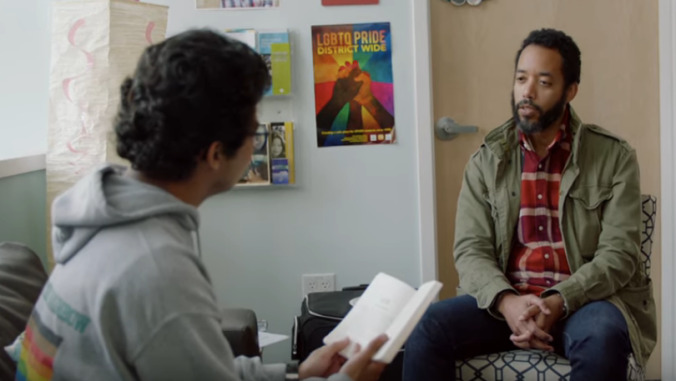Wyatt Cenac gives American schools the big F in sex ed

Wyatt Cenac’s Problem Areas continued the HBO series’ wisely witty season 2 exploration of the American educational system on Friday with a typically thoughtful dive into the seething, hormonal mess that is sex ed. Taking viewers on a tour through troubling statistics (only 24 states require sex ed, and only 13 of those mandate that the information be medically accurate), Cenac spent the bulk of the episode talking to his usual roster of parents, educators, administrators, and students, all of whom shared distressingly similar tales of being un- or misinformed. Cenac also shared the very book he claimed was all he had to turn to in his school library. Sure, it was about animal husbandry, but, as he claimed, he’s now a fully qualified goat duela, so it wasn’t all bad.
But it is pretty much all bad for kids in schools and school districts where sexuality isn’t discussed, or, even worse, where outdated and prejudicial attitudes about sex, sexuality, and consent are codified into curriculum. You know, like the one educational film that shows a young man being grossed out by his girlfriend’s sexual past, as embodied by a busted pair of old sneakers the boy claims, look like the whole football team wore them. Cenac, apart from questioning what that lesson does to puberty-deep teens, also had to ask what football team all wears women’s size 7 sneakers. But he digresses. He also spoke to those who see how gender and racial stereotypes see black girls being disproportionately disciplined and policed for their behavior. Like Egypt, a black lesbian high schooler who found herself being repeatedly punished after a typically teen-messy breakup with her white girlfriend because she was assumed to be the “aggressor,” as well as “the boy” in the relationship by school staff.
For LGBTQ kids, naturally and depressingly, things are even worse. Even in California, which has passed legislation mandating comprehensive and inclusive sex ed, advocates talk about having to overcome individual biases in teachers and administrators that put already beleaguered LGBTQ kids in an even more precarious position. “It’s life or death important,” says one, explaining how the simple matter of school workers wearing a gay-friendly ID badge can make kids feel welcomed, and seen, in a system where, traditionally, their existence “isn’t validated.” Speaking to a young gay student named Santana, book of uncomfortable sex questions in hand, Cenac listened (and intermittently cracked the kid up) as the student feelingly explained how his transfer from a religious school to one of San Francisco’s more sex ed-progressive high schools made him feel like, as he puts it, “Maybe I deserve to live.”
Cenac also took on gendered toys, which, he claims, start the whole gender and sexuality stereotyping from the jump. Will painting war toys pink solve everything? No, according to Cenac, probably not. But he also has some sage advice about “fuck parties,” which is all related, somehow.